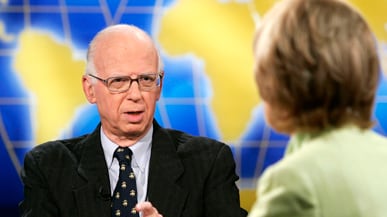The first time I met David Broder, I was terrified.
Terrified and awed.

It was a February day in Manchester, New Hampshire, in 1976, and I was a college volunteer in the quixotic presidential campaign of Sargent Shriver. As an aspiring newspaper reporter, I’d read about Broder in Timothy Crouse’s classic media-political chronicle The Boys on the Bus—and I was taken with how he managed to cope with Hunter S. Thompson’s nutty antics, in Crouse’s account, with perfect equanimity. Now, here he was in the flesh, a famous, powerful journalist in the Shriver headquarters; a slim, serious-looking man with a deceptively slow-talking manner, and he was asking me, this political tenderfoot, if it’d be OK to interview me about why I was involved in the democratic process and what did I think of it all.
I’m afraid I choked and, making excuses, fled—leaving the Dean of Washington journalists to find someone less green and more articulate.
For David, politics was more than a game: He took the proper functioning of democracy very seriously. And he knew more about it than most of its players.
Years later, when I found myself working side by side with David covering the 1988 presidential campaign for the national staff of The Washington Post, I reminded him of this mortifying (for me, anyway) encounter. “It’s great to have you as a colleague,” he said with one of his puckish grins.
By this time, David was a late-middle-aged guy in the middle of his 17th election cycle, yet he wasn’t jaded at all. Instead, he approached his task with a palpable sense of joy. He loved his job, to which he brought a humming energy that you didn’t even notice at first, because he was calm and calming under deadline. He loved going to campaign events and chatting up the faithful. He loved politicians and their foibles—and he was deeply entertained by them and entertaining about them, gently skewering his targets with a piercing, deadpan wit (mostly after hours over dinner; not as often in print). He was also a master of the game, knowing much more about it than most of its players. Beyond that, it was, for David, more than a game: He took the proper functioning of democracy very seriously.
It has been remarked elsewhere, with the bittersweet news of David’s passing, how generous he was as a colleague—especially to nervous younger reporters hoping to make good. “Help yourself!” he’d say, letting his notebook fall open to a less competent journalist at a press conference who didn’t quite hear the money quote. (He took thorough notes in a clean, legible cursive.)
I’m sure I gave David ample cause to be annoyed with me from time to time, but the only moment he ever showed it was one day in 1996 when “B-1 Bob” Dornan, the rabidly colorful California Republican and a marginal player by most definitions, was going to announce his candidacy for the White House.
“Are you going to the Dornan press conference?” he asked.
“No, I don’t really care about Bob Dornan,” I said.
David shot me a ferocious glare. “What do you mean you don’t care about Bob Dornan? He’s running for president. And you’re a political reporter for The Washington Post!”
It was chastening to know that I’d disappointed David, revealing myself as someone who didn’t meet his standards of seriousness, to say nothing of his enthusiasm and sheer joy, about the political process. I felt guilty for days afterward—but I didn’t go to the press conference.
Lloyd Grove is editor at large for The Daily Beast. He is also a frequent contributor to New York magazine and was a contributing editor for Condé Nast Portfolio. He wrote a gossip column for the New York Daily News from 2003 to 2006. Prior to that, he wrote the Reliable Source column for The Washington Post, where he spent 23 years covering politics, the media, and other subjects.






